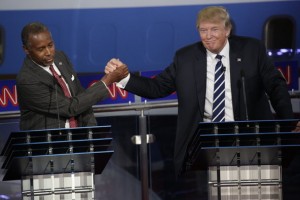I’m a political news junkie. But I’m not a reality TV fan. Nonetheless, I’ve watched the recent republican presidential debates, which seem to be a strange mix of politics and reality TV. Whether you’re a democrat, republican, libertarian, or independent, if you are a communications professional, there are several takeaways from the most recent debate.
It serves as a natural platform for highlighting some of the do’s and don’ts of effective communication, whether in an interview, presentation or 1:1 discussion. The following are my observations on the winners and losers of the latest debate from a communications perspective:
The Winners
1. Be prepared. As one of my colleagues who is an expert in media training and crisis communications often says, most of us are “wing it” challenged. In other words, most of us need to invest some time and energy in planning ahead for success. When it comes to preparing for a presentation or media interview, for example, it’s important to anticipate the questions you are likely to get from your interviewers, audience and challengers, in the case of a debate or election. If you spend just 15 minutes, you can likely come up with an easy list of 20 questions you can expect. Write them down and decide ahead of time how you will respond to them. This simple exercise will equip you with more confidence and a better outcome.
And the winner for being prepared is…….Marco Rubio. He had a strong and thoughtful answer for each question that was thrown his way. Whether you agree with his perspective or not, you have to give him props for his confidence and delivery. His answers suggest he spent time anticipating the questions and preparing bulleted responses that sounded thoughtful and polished.
2. Stick to the key messages. Determining ahead of time the 2-3 things you most want your audience to know about you or your company is important. It’s not about spin or avoiding the question –but it is about ensuring that your responses link back to the key things you want the audience to remember. And remember, people need to hear something at least 5-7 times before it sticks. So knowing how to “bridge” to key messages with any question is critical for making sure your audience is not only listening, but hearing and remembering.
And the winner in the key message category is…….Governor John Kasich of Ohio. Not being an Ohioan, I am not that familiar with Kasich or his track record. But following the debate, I was able to recall things about him that I could not recall from the comments of any other candidate. He consistently communicated that while in Congress, he helped to balance the budget and as Governor of Ohio, he turned an $8 million deficit into a $2 billion surplus.
 3. Differentiate yourself. In addition to identifying your key messages, you have to rise above the noise of others vying for the attention, mindshare and loyalty of your audience. It’s not about making things up –it’s about being authentic –it’s about identifying what makes you (or your company) uniquely you and communicating the strength of that characteristic or attribute. As one of my colleagues says, branding is not about the art of invention but the art of extraction.
3. Differentiate yourself. In addition to identifying your key messages, you have to rise above the noise of others vying for the attention, mindshare and loyalty of your audience. It’s not about making things up –it’s about being authentic –it’s about identifying what makes you (or your company) uniquely you and communicating the strength of that characteristic or attribute. As one of my colleagues says, branding is not about the art of invention but the art of extraction.
And the winner for differentiation is…….Carly Fiorina. And not because she was the only woman at the debate. Fiorina differentiated herself by rising above the noise of the other candidates, including her pithy response to the question about her reaction to Trump’s disparaging remarks on her appearance, to which she replied “Mr. Trump said he heard clearly what Mr. Bush said. I think women all over this country heard very clearly what Mr. Trump said.” She distinguished herself again when asked about which woman she would put on the $10 bill. To that, she replied that she wouldn’t change the face on the bill because it’s an empty gesture. She went on to recast women in the minds of voters –from a “special interest group” to the “majority of the nation” and “half the potential of this nation.”
The Losers
 1. Be careful with the company you keep. Just as there are company brands, we each have a personal brand and reputation as well. While I’m definitely not advocating for polarization, elitism, or separatism, it is important to align yourself with people, ideas and experiences that elevate your brand rather than detract from it.
1. Be careful with the company you keep. Just as there are company brands, we each have a personal brand and reputation as well. While I’m definitely not advocating for polarization, elitism, or separatism, it is important to align yourself with people, ideas and experiences that elevate your brand rather than detract from it.
And the loser is……Ben Carson. I saw it coming and felt like everything went into slow motion when Dr. Carson clasped hands with Donald Trump. In the split second it took to happen, I blurted out to the television –“Don’t do it, Ben!” But it was too late. Those two men have about as much in common as Mother Teresa and Pablo Escobar. I’m not suggesting that they can’t engage in civil discourse, but the equivalent of a fist bump between Carson and Trump was, in my opinion, a minus in Carson’s brand column.
2. Be honest, but have a filter. In this day and age, what you say –as a person or as a corporation is not enough –your stakeholders are listening to what you say and what you don’t say, and they are paying close attention to your actions. To gain and maintain the trust of your stakeholders it is important to know when to speak, what to say and what not to say. Being honest and even transparent is not the same as saying everything that comes to mind. But it is about integrity and being respectful.
And the loser is……Donald Trump. Need I say more? I’m not sure that man can make it through a single response without exuding his narcissism or offending a person or entire group of people. So, while some may applaud his candor, most still bristle at his delivery and attitude. I doubt he’ll ever show up as an example in Steven Covey’s book on how to win friends and influence people, no matter how many billions of dollars he has made.
3. The delivery is as important as the message. While it can be advantageous to demonstrate energy and passion for your beliefs and opinions, it is quite another to allow your message to be eradicated by your delivery. Even those with natural strengths in public speaking and presentation need practice. Being prepared by anticipating questions and identifying key messages is not enough. You have to practice, so that your delivery is authentic, and so that you won’t be rattled by unexpected questions or accusations.
And the loser is……Chris Christie. While he was attempting to be the “face and voice” of the middle class, instead, he came across as a whiny toddler who wasn’t getting his way. Despite some of the controversy around Christie, he has some solid accomplishments to his name. However, he allowed emotion to rule his delivery, defeating any message he was hoping to delivery to would-be supporters.
So those are my observations. What are yours? How would you score the candidates on their skill as communicators?
Photo Credits: The Atlantic and The New York Times
